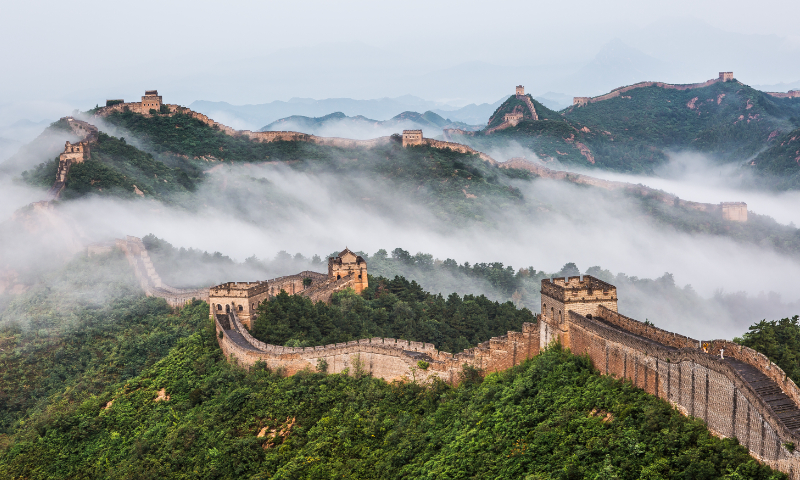
The Great Wall File Photo: VCG
From a virtual visit to Chinese ancient architecture to online museums, more and more antiques and cultural relics have been moved online with high technology solutions such as virtual reality, as insiders say that digitalization is playing a more important role in future protection of relics.
The Great Wall virtual travel application "Yunyou Great Wall" was officially launched on Saturday on a joint press conference by People's Daily, the China Cultural Relics Protection Foundation and the Tencent Charity Foundation. The app is another example of the leading technology being used in the protection of China's cultural relics.
Developed by researchers from the School of Architecture of Tianjin University and other institutions for the protection of the Great Wall, the app involves cloud gaming technology, a streaming service that provides high-quality content, to achieve an immersive and interactive digital recreation of the largest cultural heritage in China.
The Great Wall is also seen as a symbol of China's civilization. Yet, after thousands of years of natural erosion some sections have been severely damaged. "Some [parts] of the Great Wall are on the verge of disappearing," Gu Yucai, Deputy Director General of the National Cultural Heritage Administration noted on the press conference.
"The National Administration of Cultural Heritage has attached great importance to the protection of the Great Wall by introducing the relevant regulations. And we want more people to get involved in protecting and understanding the spirit of the Great Wall," Gu remarked
"The government has highly appreciated the protection of these relics, but the Great Wall protection is a systematic project where society should give a hand," Gu said on the press, adding that "over the years, the government has taken the Great Wall as the top priority of cultural heritage protection work. What's more, technology is an important force that empowers cultural heritage protection. This app has become a technical tool and communication is an important force that empowers the protection of Chinese cultural heritage."
"Under the advocacy of the government, our foundation has actively explored the digital protection of culture," said Liu Yuzhu, Chairman of the China Cultural Relics Protection Foundation. "The innovative method of the Great Wall has prompted the participation of the whole society," Liu said.
Undoubtedly, digitalization has become a trend over the years under the impact of COVID-19. Many museums and cultural institutions, and of course, tourist sites, have been trying to explore online exhibitions for their customers.
For example, the developers of the app called AR Museum have been trying for years to maximize the use of digitalization to fill in the flaws of on-site visits.
The surrounding trees move with the breeze and the water is gurgling. A group of people walked by the river on horseback and on foot. A man looked into the river and heard a roar. It turned out that a tiger was carrying his cub across the river. Everyone was surprised and excited. By wearing a VR goggles, users will clearly see the virtual image of each painting and antiques coming alive in front of them.
"Dozens of words are printed on the description next to the cultural relics and the amount of information expressed is very limited. Thousands of years of cultural relics cannot be clearly expressed in just a few dozen words. Especially when there are huge crowds visiting, it is impossible to be next to the cultural relics," noted Yang Xiaohua, co-founder of AR Museum, to the Global Times.
Bearing the idea, Yang and his friends contacted museums across the country to cooperate with them to upload in an application the details and patterns of the relics exhibited on each museum.
"It is no doubt that the digitalization is playing more and more important role in showcasing cultural relics as well as their protection, but it does not mean that the VR will ever replace reality. Our intention was to bring more people to appreciate culture and now we are still on the way," said Yang.




